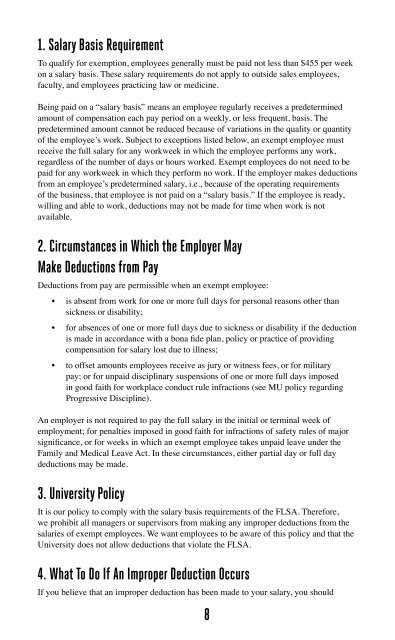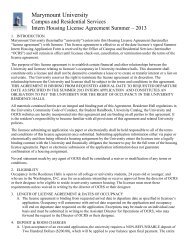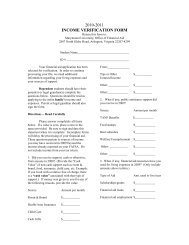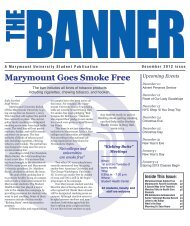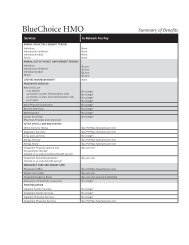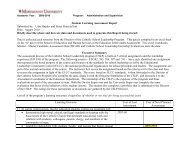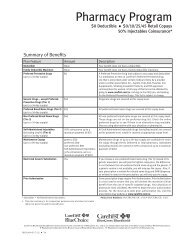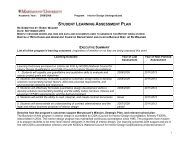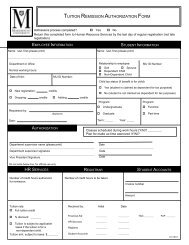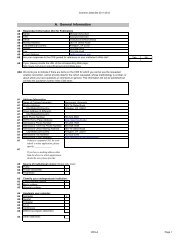EmployEE Handbook - Marymount University
EmployEE Handbook - Marymount University
EmployEE Handbook - Marymount University
You also want an ePaper? Increase the reach of your titles
YUMPU automatically turns print PDFs into web optimized ePapers that Google loves.
1. Salary Basis Requirement<br />
To qualify for exemption, employees generally must be paid not less than $455 per week<br />
on a salary basis. These salary requirements do not apply to outside sales employees,<br />
faculty, and employees practicing law or medicine.<br />
Being paid on a “salary basis” means an employee regularly receives a predetermined<br />
amount of compensation each pay period on a weekly, or less frequent, basis. The<br />
predetermined amount cannot be reduced because of variations in the quality or quantity<br />
of the employee’s work. Subject to exceptions listed below, an exempt employee must<br />
receive the full salary for any workweek in which the employee performs any work,<br />
regardless of the number of days or hours worked. Exempt employees do not need to be<br />
paid for any workweek in which they perform no work. If the employer makes deductions<br />
from an employee’s predetermined salary, i.e., because of the operating requirements<br />
of the business, that employee is not paid on a “salary basis.” If the employee is ready,<br />
willing and able to work, deductions may not be made for time when work is not<br />
available.<br />
2. Circumstances in Which the Employer May<br />
Make Deductions from Pay<br />
Deductions from pay are permissible when an exempt employee:<br />
• is absent from work for one or more full days for personal reasons other than<br />
sickness or disability;<br />
• for absences of one or more full days due to sickness or disability if the deduction<br />
is made in accordance with a bona fide plan, policy or practice of providing<br />
compensation for salary lost due to illness;<br />
• to offset amounts employees receive as jury or witness fees, or for military<br />
pay; or for unpaid disciplinary suspensions of one or more full days imposed<br />
in good faith for workplace conduct rule infractions (see MU policy regarding<br />
Progressive Discipline).<br />
An employer is not required to pay the full salary in the initial or terminal week of<br />
employment; for penalties imposed in good faith for infractions of safety rules of major<br />
significance, or for weeks in which an exempt employee takes unpaid leave under the<br />
Family and Medical Leave Act. In these circumstances, either partial day or full day<br />
deductions may be made.<br />
3. <strong>University</strong> Policy<br />
It is our policy to comply with the salary basis requirements of the FLSA. Therefore,<br />
we prohibit all managers or supervisors from making any improper deductions from the<br />
salaries of exempt employees. We want employees to be aware of this policy and that the<br />
<strong>University</strong> does not allow deductions that violate the FLSA.<br />
4. What To Do If An Improper Deduction Occurs<br />
If you believe that an improper deduction has been made to your salary, you should<br />
8


